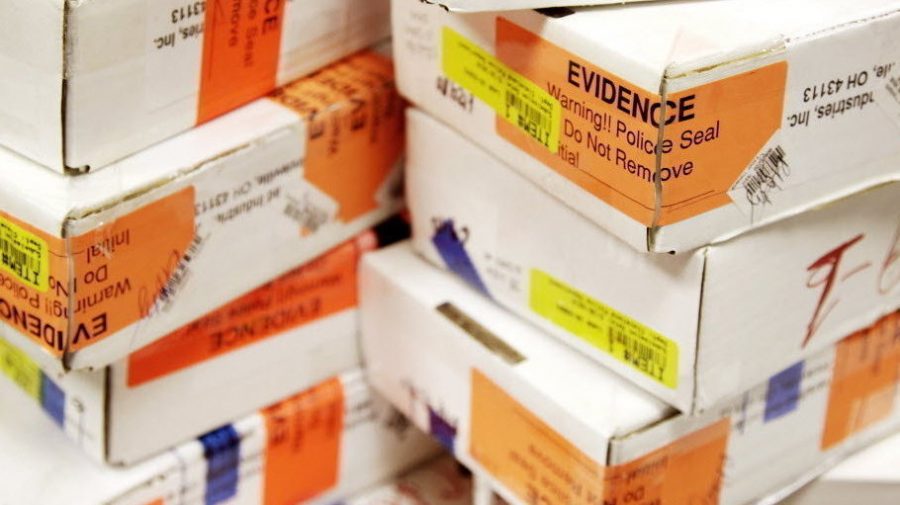Prosecution of rape cases in Cleveland has risen dramatically due to procedural changes
Standard rape kits used by law enforcement. Cleveland PD delayed testing thousands of these kits from the 1990s.
Trigger Warning: rape, sexual assault.
On Sept. 9, 2020, the Cuyahoga County Sexual Assault Kit Task Force indicted its 800th sexual abuser, Angel Cruz, who attacked a woman in her home in 2007. However, due to the large backlog in untested rape kits in Cuyahoga County, Cruz would not be indicted until 2020. Cuyahoga County Prosecutor Michael O’Malley told CNN that the total number of indictments is the highest of any sexual assault kit task force in the nation. Additionally, the Cuyahoga County task force now has a 93.2 percent conviction rate. However, that was not always the case.
Before 2010, there was no clear procedure to test rape kits in Cuyahoga County, leaving each kit’s fate up to the discretion of the detective. Some were forgotten.
Nathan Ford, a former Lake County probation officer, was a serial rapist active from 1995-2000 in Cleveland. Yet, when investigating his victims, detectives rarely visited the victim, any witnesses or the crime scene. According to Barbara Hagerty of The Atlantic, detectives in Ford’s case were consistently more likely to shelve kits, rather than to send them out for testing. In one file, the detective simply noted that he could not locate the victim and subsequently closed the investigation. However, investigators located the victims within a few hours when they reopened these victims’ cases two decades later.
With a lack of investigation, Ford’s cases turned cold, leaving his victims in a perpetual state of terror. One of his victims, a woman named Liz Garcia, lived in terror and suffered from paranoia for over a decade, though her rape kit was tested. Other rape kits that were later also tied to her serial rapist did not get tested for years. At the time, she knew him as the man in a ski-mask. After raping her, he threatened to kill her family and her if she ever told police about what happened. Despite his threats, she went to the hospital to collect any evidence. She told The Atlantic, “I had knives under my pillows. I hid knives all over the house.” Over 20 rape kits would be linked to Ford.
As the years passed, the Cuyahoga County government put new laws into effect.
The police finally sent 4,000 rape kits dating from 1993-2000 in for testing shortly after the conviction of Anthony Sowell, a serial killer and convicted rapist based in Cleveland. Even as the county began sending kits into the lab, the fate of these kits were largely unknown for years. In 2015, Cuyahoga County mandated that newly received rape kit must be tested within 30 days of the date of the sexual assault. Despite shortcomings within the department, rape kits began to be sent out for testing.
However, the county did little to enforce the law, as there was no penalty for noncompliance. The county government also did not track the testing status of the kits that got sent in.
Then, one Cleveland professor began investigating. Dr. Rachel Lovell, a professor at Case Western Reserve University, spearheaded a research study in 2015. Her team partnered with the Cuyahoga County Sexual Assault Kit Task Force to track down the fate of the untested rape kits. In 40 percent of the cases sampled from the 1990s, police never contacted the victim. Her team also found that, of the kits that generated matches to the DNA Index System, almost 20 percent of these matches could be tied to a serial rapist, generating over 400 new leads. Even as she uncovered potential leads, she called for a different approach to the investigations.
Lovell told the Atlantic, “The way we’ve traditionally thought of sexual assault is this ‘he said, she said’ situation, where they investigate the sexual assault in isolation.” Looking at a crime in isolation can cause detectives to miss important information. Rather, she believes that detectives should consider the crimes that had been committed in geographical proximity.
Even the police forgot about the rape kits. Detective Keith Hunter had been a detective with the Cleveland Sex Crimes and Child Abuse Unit for over 20 years. In 2017, the Cleveland Sex Crimes and Child Abuse Unit conducted an internal investigation, resulting in the suspension of Hunter. The investigation found that he failed to send over 187 rape kits for testing during his time as an investigator. Hunter claims that he stored the kits in a “secret” room and “kept forgetting about the evidence.” Hunter also attempted to cover up the total number of untested kits as they continued to pile up. One hundred eighty-seven rape kits eventually accumulated and were untested. Hunter is still a police officer with the Cleveland PD.
Despite Hunter’s errors, the number of kits submitted for forensic testing generally increased within Cuyahoga County. From 2011 to 2019, Cuyahoga County has exhibited a 167 percent increase in test kits getting sent to the Ohio Bureau of Criminal Investigation for forensic testing, with 2,836 kits submitted for testing in 2017 alone. Then, a chain reaction followed. The large influx in the number of submissions eventually led to the indictment of over 650 rape suspects in Cuyahoga County alone. That number is up to 809 today.
Even as rapists are getting prosecuted faster than ever, time is of the essence in these cold cases. Sex crimes have a 20-year statute of limitation in Ohio. Thus, county prosecutors must race against time to get as many cases processed as possible, sadly, leaving victims from before 2000 in the dark.

Collin Wong is a fourth-year majoring in biochemistry. He is from Washington, D.C. Outside of The Observer, he enjoys writing for his blog, eating ramen...


